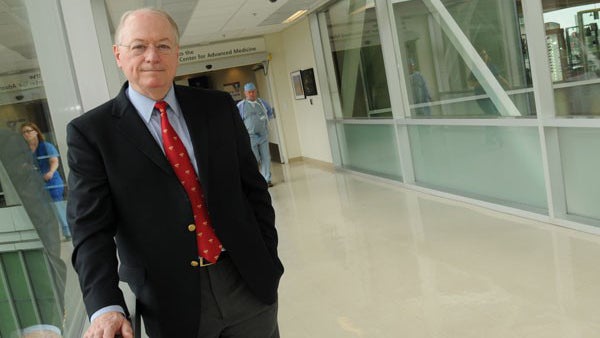Sleep interrupted
Listen
David Dinges, PhD, Professor of Psychology in Psychiatry and Chief of the Division of Sleep and Chronobiology. (Photo: Sabina Pierce Photography courtesy of Penn Medicine)
According to sleep researcher David Dinges, conventional wisdom once held that humans were flexible animals when it came to sleep: we could adapt to being awake at night and asleep during the day.
But the University of Pennsylvania psychologist said now scientists know we don’t actually adapt to these altered schedules. 15 percent of Americans do shift work, which means they work and sleep outside of regular hours. Though some cope better than others, there are serious health consequences associated with a nocturnal lifestyle.
WHYY’s behavioral health reporter Maiken Scott spoke with Dinges on “The Pulse”.
An excerpted version of their conversation is below.
MS: Do we not get the same kind of quality of sleep when we try to sleep during the day? What is different in our brain? DD: There is a fundamental change in our ability to sleep with night shift. Typically people coming off the night shift can fall asleep right away when they get home. But then they can’t stay asleep. The biological clock in the brain, the circadian clock, wakes you up prematurely. So you end up getting maybe four or five hours of sleep. Often the night shift world will say: “Well, the lawnmower outside or the light outside was causing me to wake up.” And that can happen, which is why many interventions for night shift work recommend that people black out their bedrooms and disconnect the phones. But what’s really waking you up is your brain, and then it won’t let you go back to sleep until you’re near going to work again. It just goes day after day like that, and then on days off they feel miserable.
MS: So how does our brain know that it’s day? If it’s completely dark where we are, why can’t we fool our brain into thinking it’s sleeping time? DD: The most potent factors that will adjust when you want to be awake and asleep are light and then activity rhythms. And light of a certain spectrum, light of the color blue of the sky outside. What’s bad for nightshift workers is they get light when they shouldn’t get light. The light they get during the daytime is the light that says ‘sleep at night, stay awake during the day’ to their brain. It keeps it trained to that phase. MS: Describe the toll that shift work takes on people. DD: We’ve known for some time that (being chronically sleep-deprived) can pose a risk to safety like falling asleep on the drive home from work. But there can be other ways. There can be errors in the workplace on the night shift… the grounding of the Exxon Valdez, the scram for full power in Three Mile Island.
But in addition, the primary thing that now has people concerned is the epidemiological data suggest that night shift work has carcinogenic properties. The World Health Organization has declared night shift as a carcinogenic activity. The cause-effect relationship has not been demonstrated definitively, but the association that’s found in the epidemiological population studies suggests that both prostate and breast cancer rates rise when people work night shift work. MS: What do we know about people who can tolerate shift work and those who cannot? DD: This is a very hot area for science right now. To understand these, what we call, differential vulnerabilities. Why do some people cope with shift work so much better than others? If neither adapts but some cope better, meaning they tolerate the sleepiness at night better, and they tolerate being able to sleep in the daytime, what is the mechanism of that? Is it natural genetic variation? Is it something in lifestyle? Does it have to do with demographic factors like age, or ethnicity, or sex, or gender? What are the issues here that account for it? And there is a search on for that.
There is no answer yet for what the factors are. And in fact, the big change has been that we accept that there are these differences. Historically, we assumed everybody was affected the same way: adversely. We now know that these individual differences are large and profound. Some people are affected 10 to 100-fold worse than others when we keep them awake at night, or go through a number of days of reduced sleep. That has had a profound effect on the sleep field, because we thought this variance among people was just something that occurred day to day and had to do with lifestyle or something. But this looks very, very fundamental, and it’s now been replicated in twin studies by my colleagues here at Penn and elsewhere.
We’re certain that there is some sort of fundamental variability, likely genetic, that’s causing this differential inability. We are now looking for markers for that. We do realize that this moves us into a little bit of a controversial area because the United States has a law, quite understandably and appropriately, that you cannot use genetic variability to decide who gets a job. And never would we suggest that. On the other hand, in the age of personalized medicine, where you want markers of vulnerability to be something patients are aware of, and then they can decide what lifestyle they want to live, that may be the direction we end up going in. If there’s a marker that says: ‘You have a high vulnerability to excessive sleepiness when you are sleep-deprived,’ that’s something that probably a lot of people would like to know.
WHYY is your source for fact-based, in-depth journalism and information. As a nonprofit organization, we rely on financial support from readers like you. Please give today.


